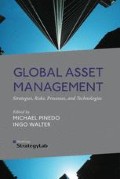Abstract
The Holy Grail in mutual funds literature has always been the analysis of performance. The literature has searched for answers to whether funds generate performance, whether they persist in doing so and whether it is enough to compensate for the fees that are charged. The answers have been mostly negative. Thus, a new question arises: if performance is not sizable and not persistent, what helps to justify the existence of the industry? The answer we will give in the following analysis is ‘marketing’. We will see how marketing strategies help to disguise poor performance and attract clients by focusing on non-performance-related features.
Access this chapter
Tax calculation will be finalised at checkout
Purchases are for personal use only
Preview
Unable to display preview. Download preview PDF.
References
Carhart, M.M. (1997) ‘On persistence in mutual fund performance’, Journal of Finance, 52(1): 57–82.
Chen, J., Hanson, S., Hong, H. and Stein, J. (2008) ‘Do hedge funds profit from mutual-fund distress?’, Working Paper.
Chen, J., Hong, H., Huang, M. and Kubik, J. (2004) ‘Does fund size erode performance? Liquidity, organizational diseconomies and active money management’, American Economic Review, 94: 1276–1302.
Chevalier, J. and Ellison, G. (1997) ‘Risk taking by mutual funds as a response to incentives’, Journal of Political Economy, 105: 1167–1200.
Chevalier, J. and Ellison, G. (1999) ‘Career concerns of mutual fund managers’, Quarterly Journal of Economics, 114: 389–432.
Coval, J.D. and Moskowitz, T.J. (1999) ‘Home bias at Home: local equity preference in domestic portfolios’, Journal of Finance, 54: 2045–2073.
Coval, J.D. and Moskowitz, T.J. (2001) ‘The geography of investment: Informed trading and asset prices’, Journal of Political Economy, 109: 811–841.
Coval, J. and Stafford, E. (2007) ‘Asset fire sales (and purchases) in equity markets’, Journal of Financial Economics, 86: 479–512.
Edelen, R.M. (1999) ‘Investor flows and the assessed performance of open-end mutual funds’, Journal of Financial Economics, 53: 439–466.
Evans, R. (2010) ‘Mutual funds incubation’, Journal of Finance, 65: 1581–1611.
Ferreira, M., Massa, M. and Matos, P. (2009), ‘Strategic market coverage and mutual fund performance’, Working Paper.
Gaspar, J., Massa, M. and Matos, P. (2006), ‘Favoritism in mutual fund families? Evidence on strategic cross-fund subsidization’, Journal of Finance, 73–104.
Guedj, I. and J. Papastaikoudi, J. (2004) ‘Can mutual fund families affect the performance of their funds?’, MIT Working Paper.
Hong, H., Kubik, J.D. and Stein, J. (2004) ‘Social interaction and stock market participation’, Journal of Finance, 59(1): 137–163.
Hong, H., Kubik, J.D. and Stein, J.C. (2005) ‘Thy neighbour’s portfolio: Word-of-mouth effects in the holdings and trades of money managers’, Journal of Finance, 60(6): 2801–2824.
Manconi, M., Massa, M. and Yasuda, A. (2012) ‘The role of institutional investors in propagating the financial crisis of 2007–2008’, Journal of Financial Economics, 104: 491–518.
Massa, M. (1998) ‘Why so many mutual funds? Mutual fund families, market segmentation and financial performance’, INSEAD mimeo.
Massa, M. (2003) ‘How do family strategies affect fund performance? When performance maximization is not the only game in town’, Journal of Financial Economics, 67: 249–304.
Massa, M. and Matos, P. (2005) ‘Beyond Grid? How style categorization affects mutual fund performance’, Working paper.
Massa, M. and Patgiri, R. (2009) ‘Incentives and mutual fund performance: Higher performance or just higher risk taking?’, Review of Financial Studies, 22: 1777–1815.
Massa, M. and Phalippou, L. (2005) ‘Mutual funds and the market for liquidity’, Working Paper.
Massa, M. and Rehman, Z. (2008) ‘Information flows within financial conglomerates: Evidence from the banks-mutual funds relationship’, Journal of Financial Economics, 89: 288–306.
Massa, M. and Yadav, V. (2010) ‘Mutual fund demand and multiple brokers’, Working Paper.
Massa, M. and Zhang, L. (2009) ‘The effects of organizational structure on asset management’, Working Paper.
Massa, M., Reuter, J. and Zitzewitz, E. (2010) ‘When should firms share credit with employees? Evidence from anonymously managed mutual funds’, Journal of Financial Economics, 95: 400–424.
Myers, M., Poterba, J.M., Shackelford, D. and Shoven, J.B. (2001) ‘Copycat funds: Information disclosure regulation and the returns to active management in the mutual fund industry’, Working Paper.
Nanda, V., Wang, J. and Zheng, L. (2003) ‘Family values and the star phenomenon’, University of Michigan Working Paper.
Sirri, E. and Tufano, P. (1998) ‘Costly search and mutual fund flows’, Journal of Finance, 53: 1589–1622.
Wermers, R. (2000) ‘Mutual fund performance: An empirical decomposition into stock-picking talent, style, transaction costs, and expenses’, Journal of Finance, 55(4): 1655–1695.
Author information
Authors and Affiliations
Editor information
Editors and Affiliations
Copyright information
© 2013 SimCorp StrategyLab
About this chapter
Cite this chapter
Massa, M. (2013). What Do We Know About the Mutual Fund Industry?. In: Pinedo, M., Walter, I. (eds) Global Asset Management. Palgrave Macmillan, London. https://doi.org/10.1057/9781137328878_2
Download citation
DOI: https://doi.org/10.1057/9781137328878_2
Publisher Name: Palgrave Macmillan, London
Print ISBN: 978-1-349-46058-8
Online ISBN: 978-1-137-32887-8
eBook Packages: Palgrave Business & Management CollectionBusiness and Management (R0)

